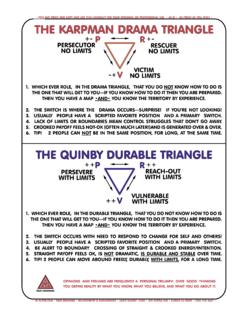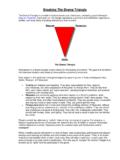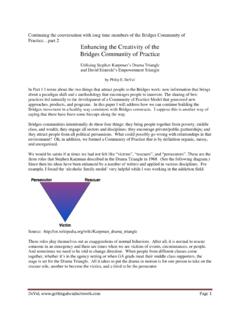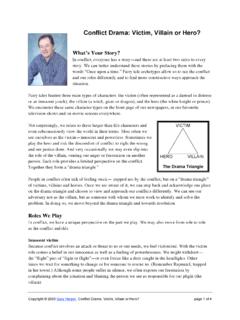Transcription of Making the Shift from Drama to Empowerment - CBODN
1 Making the Shift from Drama to Empowerment Thoughts: Life happens to me it s not my fault I am powerless My dream isn t possible Poor me Feelings: Helpless and Hopeless Victimized Discounted Behaviors: Reacts to problems and Drama May distance themselves Gives up Little energy for forward action Thoughts: I have a choice despite my circumstances I am dedicated to continuing growth I am focused on what I want to create Feelings: Hopeful Energized Inspired Resilient Behaviors: Action oriented toward desired outcomes Takes responsibility to make choices Uses Baby Steps to learn and grow Thoughts: I must save others from harm If I do good, it will be worthy I feel sorry for them (Victim) Feelings: Fears not being needed Feels persecuted when Victim doesn t accept their help Feels superior to Victim Behaviors: Jumps in to save the day Fosters dependency & indispensability May sacrifice the truth to protect others Thoughts: People are resourceful and creative I trust others and their abilities Feelings: Compassionate and engaged Fulfilled and reflective Supportive and non-attached Behaviors.
2 Uses inquiry to help others and self to develop their own clarity and vision Empowers and develops others Encourages and provides positive reinforcement Thoughts: I must win Dominating others will get me ahead I know best Feelings: Defensive, on guard Protective Self-righteous Behaviors: Dominates and controls Critical and blames Exerts covert/overt power over others Manipulative Thoughts: Things unfold at their own pace You can do it Trust the process Feelings: Self awareness Empowered through living their values Confident, direct and clear Behaviors: Provokes or evokes themselves and others to take action Focuses on improvement and growth Holds self and others accountable shifts from putting down to building up Victim Creator Persecutor Challenger Rescuer Coach shifts from telling to asking shifts from reacting to choosing At the heart of TED* (*The Empowerment Dynamic) is learning to Shift from reacting to choosing our response to life events.
3 The Empowerment Dynamic is the antidote to the Drama Triangle, (first described by Stephen karpman , MD) and its three toxic roles of Victim (the primary role), the Persecutor (who the Victim blames for their suffering) and the Rescuer (who steps in to relieve the Victim s suffering). TED* represents a Shift from the Drama Triangle to empowering relationships through its more resourceful roles of Creator, Challenger and Coach. People who live and work from the TED* framework, learn to choose their response to life, irrespective of circumstances. 2013 All rights reserved: from David Emerald s book, The Power of TED* (*The Empowerment Dynamic). 206-780-9900 Making the Shift from Drama to Empowerment *The Empowerment Dynamic TED* Dreaded Drama Triangle ( karpman s Drama Triangle) Victim Creator Persecutor Challenger Rescuer Coach Focuses on vision and desired outcomes.
4 Takes full responsibility for initiating action to achieve their desired outcomes. Sparks learning by challenging assumptions and the status quo. Focuses on improvement and development by holding people accountable for taking action. Empowers people through inquiry to help them gain clarity. Thinks they are powerless and at the mercy of life circumstances. Is unwilling to take responsibility for what happens in their life. Intervenes on behalf of the Victim to save them from perceived harm. Fosters dependency by relieving the Victim of taking responsibility. Thinks they must win at any cost. Controls others through blame, criticism, and oppression. David Emerald is the author of The Power of TED*, an executive coach, and uplifting keynote speaker who lives in the Pacific Northwest with his wife and business partner, Donna Zajonc.
5 A master facilitator and speaker, what sets David apart is his authentic style of presenting. David has over thirty years of experience of leadership development that has led to developing his simple, yet profound, TED* framework. 2013 All rights reserved: from David Emerald s book, The Power of TED* (*The Empowerment Dynamic). 206-780-9900 The TED* framework is an exciting new facilitation and coaching tool. The Dreaded Drama Triangle (DDT) roles of Victim, Persecutor and Rescuer help people to see the disempowering roles they may take on. But what are the alternative roles? The TED* roles of Creator, Challenger and Coach are powerful alternatives to the DDT and increase our capacity to be at choice in most circumstances.
6 Contact us to learn more about our products and services. Donna Zajonc PCC, Director of Coaching and Practitioner Services for the Power of TED*. Donna has over ten years experience as a leadership coach, keynote speaker, facilitator and trainer. She is passionate about building individual and collective capacity to help Shift from reactive conversations to more creative and empowering dialogue. Working with Donna and David, participants walk away feeling inspired and eager to take action.









